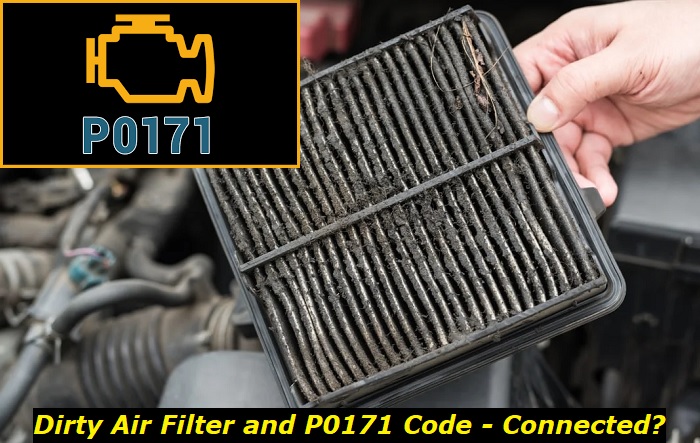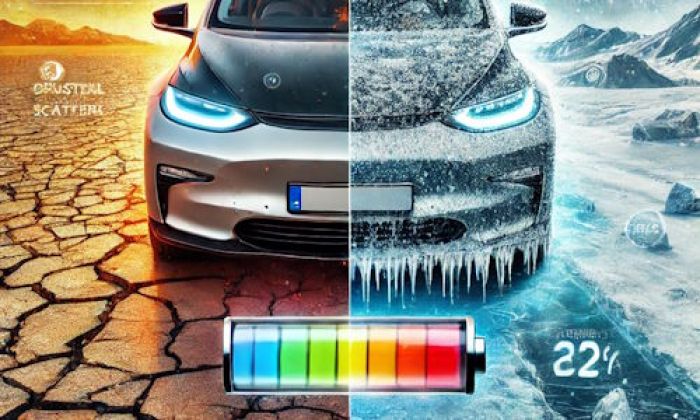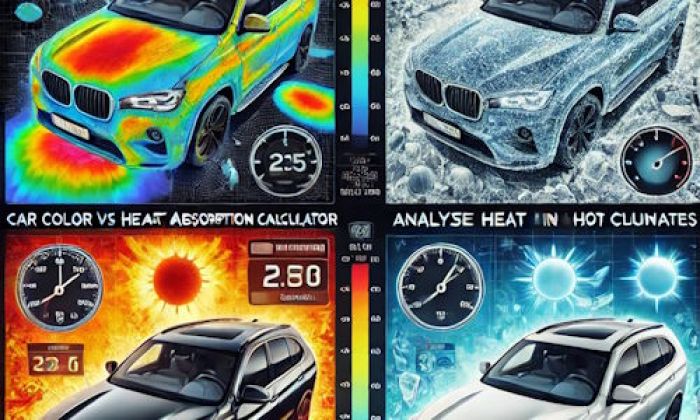Your vehicle has an air filter that cleans and regulates airflow into the combustion chamber. If the engine does not receive sufficient oxygen supply, it will not produce enough power to move your car. Moreover, if the air filter goes bad, it may affect the airflow by hindering its flow or allowing too much of it into the combustion chamber.
P0171 code highlights
- Level of urgency:Medium
- Possible culprits:MAF sensor, fuel pump, clogged filters, vacuum leaks
- Price for repair:$150 - $400
- If neglected:Harsh work of the engine, high fuel consumption, engine damage
- DIY repairs:Possible
- Can you drive?Carefully

Will a Dirty Air Filter Cause a P0171 Code?
Before we look at how a dirty air filter can cause your ECM to throw in the P0171 code, let us first look at the meaning of the code itself.
Your vehicle has a Powertrain Control Module that detects when there is a problem with your engine. When this module sees that the ratio of air to fuel going into the combustion chamber is too lean, it throws in the P0171 code.
When the air filter gets extremely dirty, it may block, thus restricting airflow into the combustion chamber. When this happens, it may cause the ECM to send the P0171 error code.
Therefore, the answer is yes; a dirty air filter can cause a P0171 code. However, other factors, including a faulty MAF sensor, bad 02 sensors, and a blocked fuel filter, could all lead to the PCM sending the P0171 code.
Other Causes of P0171 Code?
1) Vacuum Leak
In an internal combustion engine, pistons move up and down inside the cylinders, drawing in air and compressing the air-fuel mixture for proper combustion. The movement of these pistons and the compression of the throttle plate creates a vacuum, enhancing the engine's smooth running.
Many engine components depend on this vacuum to operate. Depending on your vehicle model, these components may include brake boosters, fuel pressure regulators, and other parts.
A vacuum leak in your intake manifold may cause other issues because it allows unmetered air into the combustion chamber. This disrupts the air-to-fuel ratio, causing the engine to run lean. Your powertrain control module will sense and issue the P0171 code when this happens.
Symptoms of Vacuum Leak:
- Check engine light illuminates
- Engine stalling
- Too fast idle
- Engine running rough
- Increased fuel consumption
- Increased emissions
2) Dirty or Blocked Fuel Injectors
Fuel injectors are crucial components of your engine. They help determine the performance of the motor by sufficiently supplying fuel to the intake manifold.
As carbon deposits are natural byproducts of internal combustion engines, they fall on your fuel injectors, eventually blocking them. When the injectors clog, they can no longer supply fuel to the cylinders or intake manifold sufficiently. This affects the air-to-fuel ratio entering the combustion chamber.
When fuel injectors clog, the Powertrain Control Module may send one or two fault codes, P0171 and P0174. Both codes mean the PCM has detected a lean condition.
The following symptoms will show if your engine is experiencing a lean condition because of blocked fuel injectors.
- Engine misfiring, especially sputtering when you depress the gas pedal
- Rough idling
- Increased fuel consumption
3) Bad Oxygen Sensors
The O2 sensor is a crucial component of any vehicle. It is responsible for what its name suggests, sensing the amount of oxygen in the exhaust. The oxygen sensor plays a critical role in maintaining the balance between air and fuel, encouraging safe emissions.
Every vehicle typically has two or more oxygen sensors throughout the exhaust system. You will find the first O2 sensor right before the catalytic converter and another downstream after the cat converter. The first O2 sensor regulates fuel, while the other regulates the cat converter's efficiency.
If the oxygen sensors detect the exhaust gas mixture being too rich with oxygen in the exhaust, it sends signals to the electronic control module. The ECU then increases the fuel supply to the engine cylinders. If the exhaust mixture appears too lean, the sensor sends a signal to the ECU to decrease the fuel going into the engine.
When the oxygen sensor fails, the ECU can no longer receive the right signals. As a result, it will try guessing around attempting to improve the performance of your engine. If this is the case, your vehicle will show some signs that will tell you that your O2 sensors may be faulty. One of those symptoms is the check engine light.
Moreover, the ECU will throw in some fault codes when oxygen sensors fail in your car. One of those fault codes is the P0171, which means your system is running too lean.
4) Issues with the MAF Sensor
The MAF Sensor determines the amount of air going into the fuel injection system of your engine. When it collects this data, the MAF sensor sends it to the ECU, which it uses to balance fuel delivery into the engine's combustion chamber. When this component faults, it may lead to many problems, leading to poor engine performance.
When the MAF sensor fails, and the ECU detects it, it causes the P0171 and P0174 fault codes. These codes mean your system is running lean. When dirt coats the MAF sensor, it can no longer measure the mass airflow accurately.
When you turn off your engine, fuel vapors back up via the intake manifold and contaminate the MAF sensor; when these vapors coat the MAF sensor wires, they cause the sensor to report inaccurate data to the ECU, causing it to inject insufficient fuel into the engine cylinders. If your engine receives more air and less fuel, it may run lean, thus the P0171 fault code.
How severe is Code P0171?
While you will only experience minor performance issues if you drive with the P0171 code, it is a severe fault code. Driving before diagnosing and fixing the problem causing this code could overheat and damage your engine. If there is a problem with the air-to-fuel ratio going into the combustion chamber, it will greatly affect the fuel efficiency of your vehicle.
When your vehicle runs lean, the engine may misfire, putting raw fuel into the catalytic converter, which could cause severe damage to the internals of the cat converter. To avoid spending more on avoidable damages, ensure you diagnose and repair any problems causing the P0171 code to appear.
Is It Safe to Drive with a Dirty Engine Air Filter?
Suppose your diagnosis for the P0171 code points you toward a dirty air filter. Is it okay to keep driving?
Although a dirty air filter will not immobilize your vehicle, it is important to fix the issue as soon as you learn about it. Driving with a clogged air filter can cause damage to the engine. Professional mechanics recommend checking the condition of the air filter regularly and cleaning it when necessary. This will help you to avoid unnecessary repair costs in the future.
Keeping your vehicle in good condition is crucial, especially in areas and possible causes of the code P0171. Your system running lean could cause more damage than just consuming excessive fuel.
How Often Should I Replace the Air Filter?
You should check and replace the air filter in your engine regularly. The most accurate answer as to when to change yours is; it depends. It depends on several factors, including your vehicle's make and model year, where you drive, and when you drive. How you drive can also affect the replacement intervals of the engine air filter.
The easiest and best way to know when to change your air filter is to consult your vehicle owner's manual or search the internet. Better still, you can keep a record of when you changed the filter. Two times is a coincidence, but the third makes it a pattern.
A visual inspection is usually the best option. A clean filter will be stark white or off-white. If it requires cleaning or changing, the air filter will be dirty with visible dust or stains. If you do not trust your judgment, any reputable corner mechanic will confirm your doubts by checking your filter.
Moreover, do not trust a mechanic who recommends air filter replacement every 3,000 or 5,000 miles.
Conclusion
P0171 is a fault code that could appear for multiple reasons. Your mechanic can run a diagnosis and provide a detailed report of the exact cause of the error code. If this code appears because of a dirty air filter, you can clean or replace it, depending on the filter's condition.
The code P0171 means your system is running lean. You will experience excessive fuel consumption and other drivability problems in this state. It is important to diagnose your vehicle and fix the air filter or other possible causes of the P0171 error code.
About the authors
The CarAraC research team is composed of seasoned auto mechanics and automotive industry professionals, including individuals with advanced degrees and certifications in their field. Our team members boast prestigious credentials, reflecting their extensive knowledge and skills. These qualifications include: IMI: Institute of the Motor Industry, ASE-Certified Master Automobile Technicians; Coventry University, Graduate of MA in Automotive Journalism; Politecnico di Torino, Italy, MS Automotive Engineering; Ss. Cyril and Methodius University in Skopje, Mechanical University in Skopje; TOC Automotive College; DHA Suffa University, Department of Mechanical Engineering






Add comment